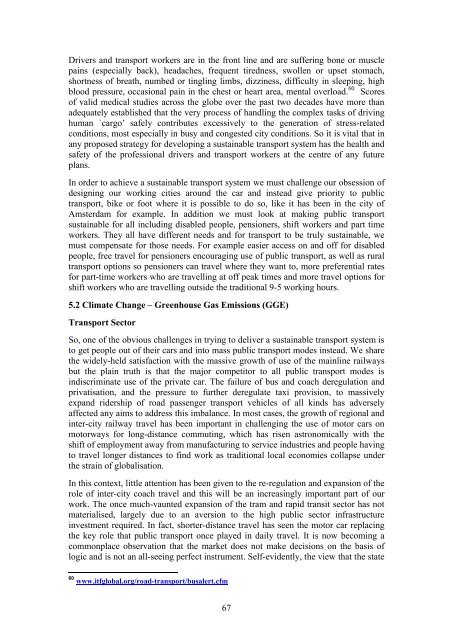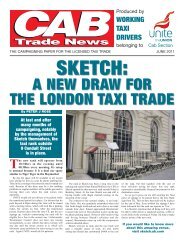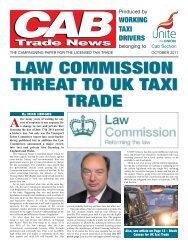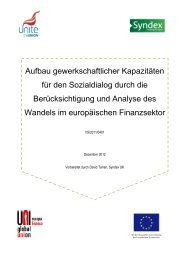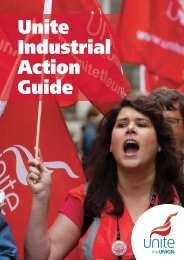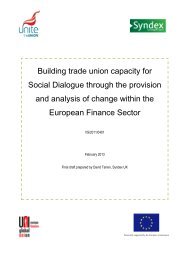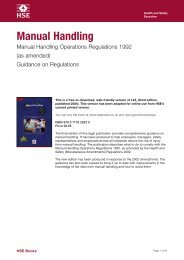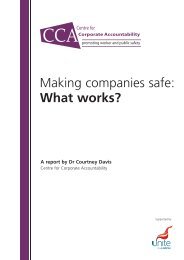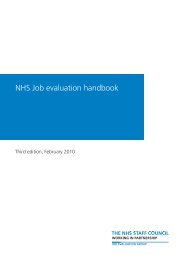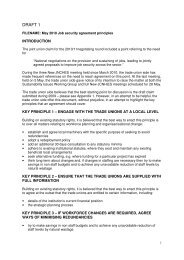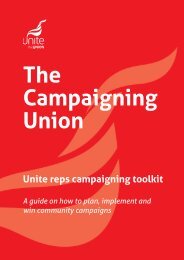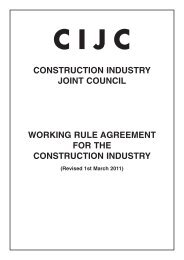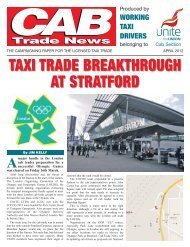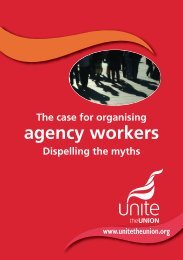Sustainable Transport and the Environment Guide - Unite the Union
Sustainable Transport and the Environment Guide - Unite the Union
Sustainable Transport and the Environment Guide - Unite the Union
Create successful ePaper yourself
Turn your PDF publications into a flip-book with our unique Google optimized e-Paper software.
Drivers <strong>and</strong> transport workers are in <strong>the</strong> front line <strong>and</strong> are suffering bone or muscle<br />
pains (especially back), headaches, frequent tiredness, swollen or upset stomach,<br />
shortness of breath, numbed or tingling limbs, dizziness, difficulty in sleeping, high<br />
blood pressure, occasional pain in <strong>the</strong> chest or heart area, mental overload. 60 Scores<br />
of valid medical studies across <strong>the</strong> globe over <strong>the</strong> past two decades have more than<br />
adequately established that <strong>the</strong> very process of h<strong>and</strong>ling <strong>the</strong> complex tasks of driving<br />
human `cargo’ safely contributes excessively to <strong>the</strong> generation of stress-related<br />
conditions, most especially in busy <strong>and</strong> congested city conditions. So it is vital that in<br />
any proposed strategy for developing a sustainable transport system has <strong>the</strong> health <strong>and</strong><br />
safety of <strong>the</strong> professional drivers <strong>and</strong> transport workers at <strong>the</strong> centre of any future<br />
plans.<br />
In order to achieve a sustainable transport system we must challenge our obsession of<br />
designing our working cities around <strong>the</strong> car <strong>and</strong> instead give priority to public<br />
transport, bike or foot where it is possible to do so, like it has been in <strong>the</strong> city of<br />
Amsterdam for example. In addition we must look at making public transport<br />
sustainable for all including disabled people, pensioners, shift workers <strong>and</strong> part time<br />
workers. They all have different needs <strong>and</strong> for transport to be truly sustainable, we<br />
must compensate for those needs. For example easier access on <strong>and</strong> off for disabled<br />
people, free travel for pensioners encouraging use of public transport, as well as rural<br />
transport options so pensioners can travel where <strong>the</strong>y want to, more preferential rates<br />
for part-time workers who are travelling at off peak times <strong>and</strong> more travel options for<br />
shift workers who are travelling outside <strong>the</strong> traditional 9-5 working hours.<br />
5.2 Climate Change – Greenhouse Gas Emissions (GGE)<br />
<strong>Transport</strong> Sector<br />
So, one of <strong>the</strong> obvious challenges in trying to deliver a sustainable transport system is<br />
to get people out of <strong>the</strong>ir cars <strong>and</strong> into mass public transport modes instead. We share<br />
<strong>the</strong> widely-held satisfaction with <strong>the</strong> massive growth of use of <strong>the</strong> mainline railways<br />
but <strong>the</strong> plain truth is that <strong>the</strong> major competitor to all public transport modes is<br />
indiscriminate use of <strong>the</strong> private car. The failure of bus <strong>and</strong> coach deregulation <strong>and</strong><br />
privatisation, <strong>and</strong> <strong>the</strong> pressure to fur<strong>the</strong>r deregulate taxi provision, to massively<br />
exp<strong>and</strong> ridership of road passenger transport vehicles of all kinds has adversely<br />
affected any aims to address this imbalance. In most cases, <strong>the</strong> growth of regional <strong>and</strong><br />
inter-city railway travel has been important in challenging <strong>the</strong> use of motor cars on<br />
motorways for long-distance commuting, which has risen astronomically with <strong>the</strong><br />
shift of employment away from manufacturing to service industries <strong>and</strong> people having<br />
to travel longer distances to find work as traditional local economies collapse under<br />
<strong>the</strong> strain of globalisation.<br />
In this context, little attention has been given to <strong>the</strong> re-regulation <strong>and</strong> expansion of <strong>the</strong><br />
role of inter-city coach travel <strong>and</strong> this will be an increasingly important part of our<br />
work. The once much-vaunted expansion of <strong>the</strong> tram <strong>and</strong> rapid transit sector has not<br />
materialised, largely due to an aversion to <strong>the</strong> high public sector infrastructure<br />
investment required. In fact, shorter-distance travel has seen <strong>the</strong> motor car replacing<br />
<strong>the</strong> key role that public transport once played in daily travel. It is now becoming a<br />
commonplace observation that <strong>the</strong> market does not make decisions on <strong>the</strong> basis of<br />
logic <strong>and</strong> is not an all-seeing perfect instrument. Self-evidently, <strong>the</strong> view that <strong>the</strong> state<br />
60 www.itfglobal.org/road-transport/busalert.cfm<br />
67


